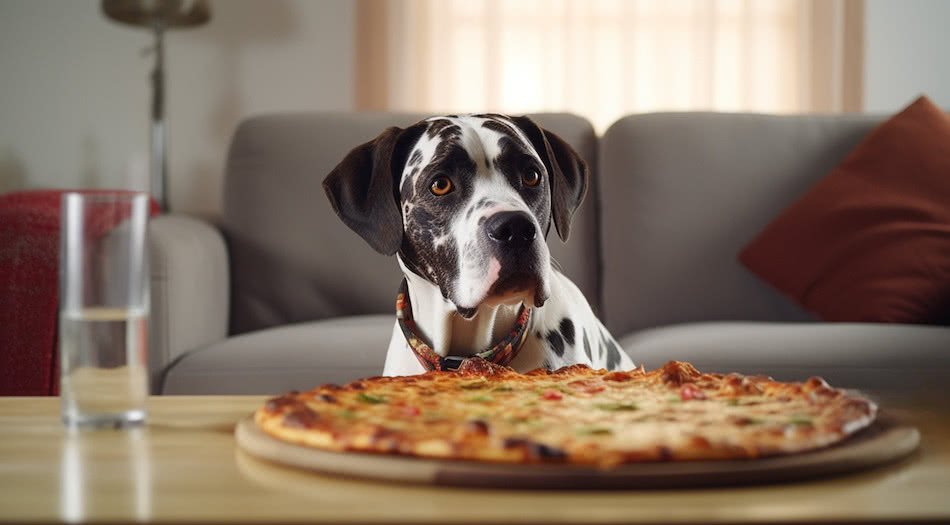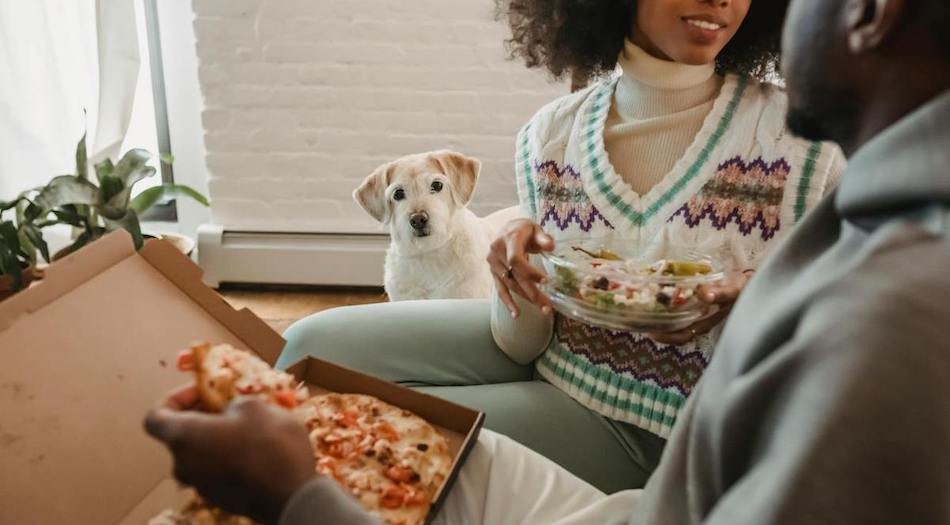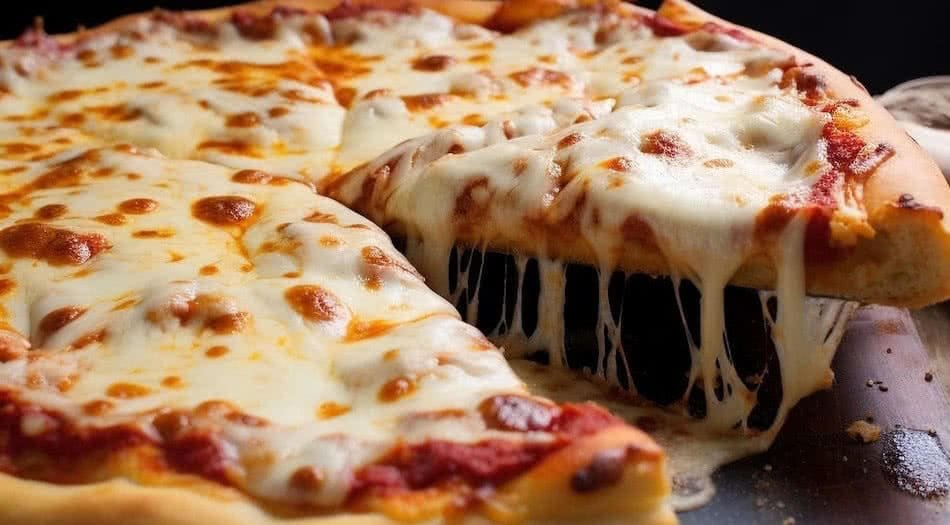Who can resist the scrumptious aroma of a freshly baked pizza wafting from the oven? It’s enough to make anyone’s mouth water. If your four-legged friend is around, you may notice him sniff the air, longing, hungry puppy-dog eyes fixed on the deep-pan. So you may be wondering if your furry friend can indulge with you. 🍕🐶 Can dogs eat pizza?

The short answer is no, dogs cannot have pizza. While it may be a favorite for us humans, it can be harmful to dogs. Many of the ingredients can be toxic to them and pizzas are also often high in fat and calories, which may lead to dog health problems. In this article we’ll explore the potential risks and options.
Before introducing any new foods to your dog’s diet, always consult your vet. Individual dogs may have different intolerances, dietary needs, and health considerations. This article is not a substitute for professional veterinary advice.
Why Does My Dog Love Pizza So Much?
Dogs have a remarkable sense of smell and a natural instinct to scavenge for food, and pizza smells and tastes so darned delicious to the best of us. Plus, dogs love eating what their owners are eating, to feel part of the clan.
However, just because a dog loves it doesn’t mean he should eat it. It’s important to remember that they have different nutritional needs than humans and should be fed a balanced diet that is appropriate for them.
Can Dogs Eat Pizza Dough?
Ahh, the crust. The thin and crispy, the soft deep pan, the stuffed-full. Can dogs eat pizza crusts and enjoy this deliciousness too? Let’s take a closer look.
The primary ingredient of pizza dough which makes the crust, is wheat flour which is generally safe for dogs. However, some may have allergies or sensitivities to gluten, which may lead to digestive issues and should be avoided in such cases.
The crust is basically a bread-like creation and contains yeast. Like in bread dough, the fermentation process may cause bloating or even alcohol poisoning if consumed, especially in larger quantities.

So although for most pooches a small piece of plain pizza crust might be a harmless treat, it’s also important to note that bread contains carbohydrates, which may lead to weight gain if consumed in excess.
While plain crust may be okay in moderation, seasoned crust is a different story. Many manufacturers add garlic, onion, and other flavorings which might irritate dogs’ digestive systems and be harmful, leading in some cases to vomiting and diarrhea.
Pizza Sauce Temptations
Can dogs eat pizza sauce? Well, the basis for it is tomatoes, so the answer is yes, but with some caveats. Firstly, some dogs may have trouble digesting tomatoes, which can lead to gastrointestinal upset, but for most of them tomato sauce is generally safe to eat in small amounts.
You may even have read that tomato concentrate contains a compound called lycopene, which is a powerful antioxidant that may help protect against certain types of cancer, and which may be healthy for your dog too.
The problem comes as tomato-based sauces commonly used on pizzas contain various hidden seasonings like garlic and onions. So while ripe tomatoes in small amounts are generally safe, other seasonings used can be toxic for them even when cooked. Additionally there might be excess sugar and salt which is also not good to include in the dog diet.
To avoid any potential digestive issues, it’s best to limit intake of tomato sauce. A small amount may be fine, but don’t let pooch indulge in an entire slice of pizza unless you know it doesn’t have hidden dangers.
Is Cheese a Dog’s Best Friend?
One of the main stars of pizza is of course the cheese, mozzarella if being authentic. Most dogs, like us, absolutely adore it but many are lactose intolerant, meaning they have difficulty digesting lactose, a sugar found in dairy, which may lead to gastrointestinal upset, including diarrhea, vomiting, and gas.
Occasional nibbles may be harmless, however dogs typically don’t need a lot of dairy in their diets, even if some can handle it. Packed with both fat and salt, cheese can lead to health conditions and weight gain if consumed in excess, so it’s best to go easy on cheesy treats.
Can Dogs Eat Pizza Toppings?
These can include from vegetables and meats to herbs and spices. While plain vegetables like mushrooms and bell peppers present no major risk, other favorites like processed meats can be harmful to dogs. Some ingredients may cause digestive upset, while others may lead to more severe health issues like pancreatitis or anemia.

Here are tips on making good choices for your furry friend.
The Good
- Plain tomato sauce: in small amounts.
- Vegetables: some veggies like bell peppers, mushrooms, spinach are safe in moderation.
- Lean meats: such as chicken or turkey are ok, but make sure to remove any bones and skin
The Bad
- Cheese: although a good source of protein and calcium, as we’ve seen it can be heavy for dogs. A little plain cheese may not affect your pooch too much, if he’s not sensitive to lactose, but even so make sure to remove any excess oil once cooked
- Pepperoni: this is almost synonymous with pizza but while it may be popular with humans, it is high in fat, sodium and additives which can be harmful to dogs and cause digestive issues.
- Sausage: like pepperoni, sausages may cause digestive issues, so best avoided.
- Bacon: also high in fat and salt, bacon may also cause digestive problems
The Ugly
- Garlic – this is a common ingredient in various parts of the pizza, but it’s a big no-no for dogs. It contains compounds that can be toxic to dogs, even in small amounts, which can cause damage to a dog’s red blood cells, leading to anaemia. While a small amount may not cause any harm, it’s best to err on the side of caution and avoid feeding your dog anything that contains garlic. If he or she accidentally ingests any, keep an eye out for symptoms such as vomiting, diarrhea, and lethargy, and contact your veterinarian immediately.
- Spicy toppings – Dogs have sensitive stomachs and may have trouble digesting spicy foods. Avoid things such as jalapenos or hot sauce, as they can cause additional digestive issues and discomfort.
| Crust | Not recommended, as it’s usually high in carbs and lacks nutritional value for dogs |
| Sauce | No, as it often contains garlic and onion, which are toxic to dogs. |
| Cheese | In moderation, some cheeses are safe for dogs with no lactose sensitivities, but avoid high-fat or flavored varieties. |
| Toppings | Beware as many common toppings contain hidden onion, garlic, excess salt and sugar which are toxic or harmful to dogs |
Pizza and Canine Allergies
Pizza can be a source of food allergies for some dogs. Just like humans, dogs can develop allergies or intolerances to certain foods, and many common pizza ingredients are prime culprits.
Dairy is one of the main offenders. Most dogs are lactose intolerant, meaning they can’t properly digest the lactose found in cheese. While a nibble of mozzarella might seem harmless, it can trigger symptoms like gas, diarrhea, or vomiting in dogs with lactose sensitivity.
Wheat in pizza dough is another potential allergen. Some dogs have gluten sensitivities or wheat allergies that can cause skin irritation, digestive upset, or even more serious allergic reactions like swelling and difficulty breathing.
Seasonings commonly found in pizza, like garlic and onions, are toxic to dogs, but even less harmful spices or herbs could cause reactions in sensitive dogs. Ingredients like oregano, basil, or even certain food additives can lead to itching, hives, or gastrointestinal discomfort.
Paws Off That Pizza! Why it’s a Doggy Don’t
As we’ve seen, pizzas can potentially contain a lot of things that are not good for canine nutrition. Even for those who don’t have food intolerances, allergies, or health complications there are several potential risks associated with allowing them to indulge in this food. More care may be needed depending on the age, size, and with different breeds, as some may be more sensitive. Key risks for your canine include:
Digestive Upset
Will pizza upset your dog’s stomach? The combination of ingredients in pizza can be challenging for a dog’s digestive system to handle. This can result in symptoms such as stomach pain, diarrhea, or vomiting.
Weight Gain and Obesity
Pizza can have high calorific content with unhealthy fats, carbohydrates and excess salt and sugar. Regular consumption can lead to weight gain and increase the risk of obesity, which can contribute to numerous health problems, including joint issues, heart disease, and diabetes.
Pancreatitis
Fatty foods, such as those commonly found in pizza can trigger an inflammation of the pancreas known as pancreatitis. This condition can cause severe abdominal pain, vomiting, and require veterinary attention. It may even be fatal, especially if left untreated.
Nutritional Imbalance
While pizza may contain some essential nutrients, it is not a healthy, balanced food. Continued consumption without proper supplementation may lead to nutritional deficiencies over time for your canine companion.
Moderation or Avoidance?
Can dogs handle a bite of pizza crust? How many slices of pizza can a dog eat? Can pizza kill dogs? What happens if my dog accidentally eats pizza? What happens if my dog eats a whole pepperoni pizza?! Help, my dog ate pizza crust with garlic. These are common concerns that can crop up. In most cases the occasional delicacy of a tiny bite won’t hurt a dog that has no health conditions. However it is always best to offer dog-friendly alternatives instead. And definitely don’t overdo the occasional treat.
My Dog Ate Pizza! Here’s What to Do Next
It’s unlikely that pizza will kill a dog, even if they managed to nab a load of it while your back was turned, if the dog is healthy and has no food sensitivities or other conditions. Of course it may also depend on the things the pizza had on it, such as hot chilli peppers, which may seriously affect the dog. And the size of the dog and how much he manage to wolf down.

If you are at all unsure, contact your vet. It’s always best to err on the side of caution and take medical advice from professionals, who also know your dog best.
Definitely keep an eye on him or her and monitor for discomfort and distress, unusual behavior, symptoms of food poisoning or allergic reaction Offer them water to help prevent dehydration and to aid digestion. They may well feel some discomfort.
If your dog doesn’t seem in distress at all still keep an eye on him, and offer water.
It will hopefully all pass through without any worries.
Pawsitive Ingredients for a Good Boy (or Girl)
While they cannot have the human version, dogs can eat pizza made for them, and there are alternative ways to satisfy their craving for this beloved dish.
How about creating a pizza for dogs? That way, you have full control over the ingredients and can tailor it to suit your pup’s needs rather than giving him people food. Adding lean meats like cooked chicken and turkey can provide a source of protein. Vegetables such as broccoli, carrots, and bell peppers can contribute vitamins and minerals. Add just a sprinkle of low fat pizza cheese on top.
Another option is to explore commercial doggy goodies that mimic the flavors of pizza, so your dog still gets to indulge in that delightful combination of flavors while maintaining good pet nutrition and preventing any harm.
FAQs
Can I give my dog pizza occasionally?
While it’s natural as a pet parent to want to share your favorite foods with your furry friend, it is best to avoid letting dogs eat pizza. There are numerous alternative, dog-friendly options available that are safer and healthier to include in the dog diet for better dog nutrition. If you still want to share a small piece of pizza with your dog on occasion, here are some guidelines to follow. First, it is important to remove any potentially harmful aspects, especially onions, garlic, excessive salt content and greasy cheese. Second, make sure the pizza is cooled down to room temperature before giving it to your dog. Finally, only offer a small partial slice as a very occasional treat.
Can dogs eat margherita pizza?
Margherita pizza only has tomato sauce and cheese as toppings. While this may be a little better than those containing processed meats, jalapenos, and other unsuitable options, other no-no’s are still likely to be included in commercial preparations, like garlic and spices, so it is best avoided.
Can puppies eat pizza?
Puppies have more sensitive digestive systems than adult dogs, so even greater care should be taken with their meals for their little bodies. They should not be given pizza that is not made specially with them in mind. It is always best to feed them appropriate dog food for puppies.
Can dogs eat pizza rolls?
Pizza rolls have pretty much the same ingredients as regular pizza. You’ll likely find they contain the same seasonings, salt and sugar, which are not good for dogs. So they too are best avoided.
Final Thoughts on Can Dogs Eat Pizza
So, can dogs eat pizza? The answer is no. You should not feed your dog human pizza. Some pizza ingredients such as onions and garlic are very toxic to dogs. Additionally the high fat and salt in cheese, pepperoni and other common toppings, which may not be toxic to dogs, can still be harmful and cause digestive issues and illness.





